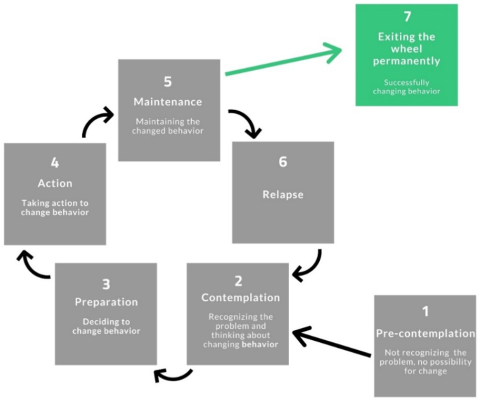Self-help program
Relapse
It takes time to change, and habits take a long time to unlearn
Habits are like a path: familiar paths are easy to travel along as they take you to familiar places. Taking a new path, or forming a new habit, can be difficult and even scary, however the more you travel the path, the stronger and easier it becomes. The more you repeat your new habits, the easier they will become, and you will be less tempted to continue your old habits. Nonetheless, it is inevitable that you will be tempted to return to your old habits at some point. This is normal, but it is important to prepare for this relapse and learn how to move past it.
Prepare for the relapse
Different factors may increase your risk of relapse, for example your emotional state.
When you are feeling confident and happy, your risk of relapse may be quite low. However when you start to feel stressed or anxious, you may be at a higher risk of relapsing and returning to your harmful behavior. Bear this in mind and be prepared to overcome potential relapse.
Wheel of Change
There are different stages in changing behavior (see image below). The “Wheel of Change” might keep turning for a while before you can get rid of the old behavior.
Because you are reading this ReDirection self-help program, you have already recognized the need for change, and you have thought about giving up CSAM use (Stage 2 Contemplation). Maybe you are already prepared to change your behavior (Stage 3 Preparation). With the help of the ReDirection program, you can learn how to live without CSAM, take steps to change your behaviour (Stage 4 Action), and ultimately maintain this change (Stage 5 Maintenance) until you have successfully changed your behaviour (Stage 7 Exiting the wheel permanently).
Relapsing is a normal part of life in all situations of change. Facing adversity does not mean that you have failed or that you cannot make a permanent change in your behavior. After experiencing a relapse, you can go back and continue on the wheel of change and learn from your relapse.

In the next task you will learn to recognize the triggers that may lead to a relapse, and you will learn alternative ways to act in risk situations.
